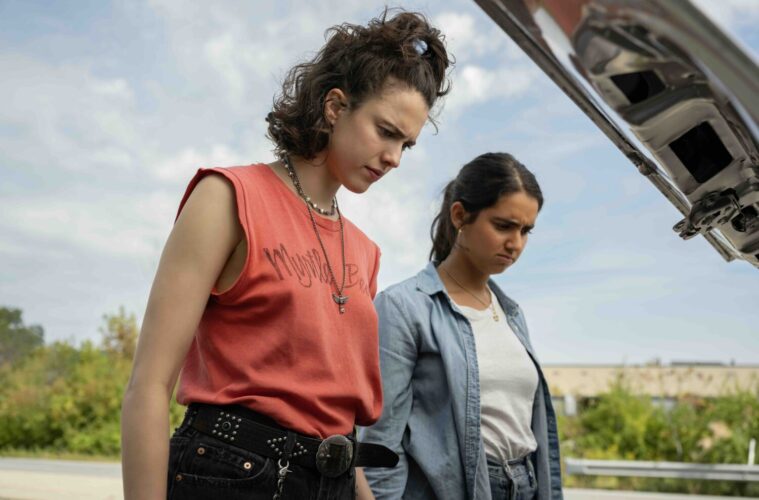 Joel and Ethan Coen are like two color records printed onto separate rolls of film. When glued together, you get something like Technicolor (the Coen style). Isolated from each other, one is clearly red and one is clearly green. A couple of Christmases ago, audiences got a glimpse of Joel alone: The Tragedy of Macbeth—brooding, serious, monochromatic. Drive Away Dolls, the first narrative film directed solely by Ethan Coen, helps us discern the kind of artist he is apart from his older brother. His creativity inclines in the opposite direction—crude, rude, colorful.
Joel and Ethan Coen are like two color records printed onto separate rolls of film. When glued together, you get something like Technicolor (the Coen style). Isolated from each other, one is clearly red and one is clearly green. A couple of Christmases ago, audiences got a glimpse of Joel alone: The Tragedy of Macbeth—brooding, serious, monochromatic. Drive Away Dolls, the first narrative film directed solely by Ethan Coen, helps us discern the kind of artist he is apart from his older brother. His creativity inclines in the opposite direction—crude, rude, colorful.
This frantic, antic comedy stars Margaret Qualley and Geraldine Viswanathan as Jamie and Marian, two friends—one uninhibited, the other buttoned up, both gay—who choose the wrong rental car for their road trip to Tallahassee. The trunk contains a suitcase wanted by a pair of clumsy but determined heavies (talkative Joey Slotnick and taciturn C.J. Wilson) who chase them across the country at the behest of their chief (deadpan Colman Domingo). Jamie’s ex-girlfriend (Beanie Feldstein) is the cop on their trail, and the contents of the case involve a straight-laced senator (Matt Damon) and a shady collector (Pedro Pascal). To reveal more would spoil some of the surprises, of which there are plenty.
Drive Away Dolls was co-written by Ethan Coen and his wife Tricia Cooke, who wanted to write a queer comedy that didn’t take the familiar “coming out” angle or end with the leads falling victim to a hate crime. In the early 2000s, when the script was completed and Alison Anders attached to direct, no one seemed interested in it. Two decades later, the time was right to try again. Cooke, who had worked closely with the Coens as an editor (she cut The Big Lebowski, O Brother, Where Art Thou? and The Man Who Wasn’t There), brings a strong feminine perspective, while her husband provides an aggressively eclectic style: liberal handheld camera movement, pop zooms, a variety of zany wipe effects. Some of it bubbles, some of it fizzles, but at any given moment there is enough going on, verbally or visually, to hold the attention through its tight, 84-minute runtime.
The original title, Drive Away Dykes, promises something a little trashier than what eventually made it to the screen. But if the movie feels a bit more polished and polite than anything by Russ Meyer or Doris Wishman (both cited as influences), it is still essentially a B-movie, unafraid of going for the lowbrow laugh. Apart from the occasional burst of shocking violence, the biggest tell that this is, in fact, a Coen movie, may be a character named Curlie, played by a hilariously expressionless Bill Camp. As the manager of the rental car company that sets the plot in motion, he gets the film’s biggest laugh, lying on his back, long after the audience—and any of the other characters—have forgotten about him. It’s that unmistakable “Coen touch” that keeps the whole mess afloat.
Advertising disclosure: We may receive compensation for some of the links in our stories. Thank you for supporting LA Weekly and our advertisers.

